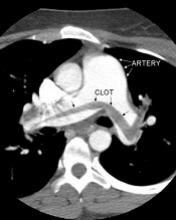WASHINGTON, DC—New research suggests US patients with pulmonary embolism (PE) rarely receive catheter-directed thrombolysis (CDT) or systemic thrombolysis (ST).
Investigators analyzed data from more than 100,000 patients who were hospitalized for PE and found that roughly 2% received CDT or ST.
These findings were presented at the American College of Cardiology’s 66th Annual Scientific Session (abstract 904-12).
“For years, ST and CDT have been available for use in patients with PE,” said study investigator Srinath Adusumalli, MD, of the University of Pennsylvania in Philadelphia.
“However, there has been little research done to understand how these therapies are being utilized in the real world. Our initial data suggest that, in fact, both ST and CDT are used infrequently to treat PE, including in young, critically ill patients who may experience the highest clinical benefit from those therapies.”
Dr Adusumalli and his colleagues performed a retrospective study in which they collected data from the OptumInsight national commercial insurance claims database.
The team identified 100,744 patients who had been hospitalized with PE during a 10-year period (2004-2014). About 2% of these patients (2.2%, n=2175) received either CDT (n=761) or ST (n=1414).
During the period studied, the number of PE hospitalizations increased by 306% (P<0.001), while the number of patients treated with CDT increased by 197% (P=0.001) and the number treated with ST increased by 514% (P<0.001).
The investigators said these findings are clinically useful and could impact decisions about patient care, but more research is needed.
“This study is the first in a 2-step research plan,” noted Bram Geller, MD, of the University of Pennsylvania.
“[O]ur next phase will be to actually evaluate the safety and clinical effectiveness of CDT versus ST by exploring patient outcomes in the OptumInsight commercial insurance claims database.”


